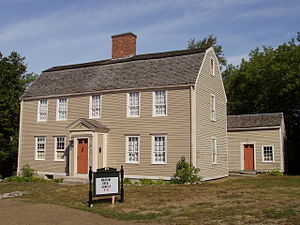Captain Brocklebank and King Philip's War
- Oct 19, 2017
- 3 min read
Updated: May 24, 2024

Captain Samuel Brocklebank (1628-1676)
Captain Samuel Brocklebank is our 9th great grandfather by the following path: RWA → Fred Pemberton Abbott → Arthur Merrill Abbott → Justin Edwards Abbott → Rebecca Boynton Abbott → Thomas Boynton → Thomas Boynton → David Boynton → Mary Dole Boynton → Mary Brocklebank Dole → Samuel Brocklebank
[News Flash: We are no longer descended from the Lowell family. Samuel Brocklebank is one of our “new” ancestors. With doing a little extra research with wills and probate records and so forth, I have reached the conclusion (as have others who seem to know what they are doing) that we are not directly descended from Percival Lowell after all. The connecting person, Mary Dole Boynton, turns out to have been the daughter of William Dole rather than the daughter of William’s brother John. It was John Dole who married into the Lowell family. As a consequence, our path skirts along that of the Lowell family, but is now connected only in an in-law sort of way. All those presumed connections to Lowell cousins are now wiped out. We get Samuel Brocklebank instead who is not quite so interesting to have as an ancestor.]
Samuel Brocklebank was born about 1628 in England and came to New England with his widowed mother Jane Brocklebank and his eight-year old brother John. They were members of Ezekiel Rogers’s company who came on the ship John of London and arrived in New England in December 1638. After wintering in Salem, in the Spring 1639 the group settled in what would be incorporated as Rowley 4 September 1639. Jane Brocklebank received a grant of land there and raised her two sons.

In 1658, Samuel married Hannah whose maiden name is unknown. There is some speculation that she might have been a cousin and her maiden name is also Brocklebank, but no one knows. Samuel and Hannah had 10 children. In the late 1660’s, he built what is known as the Brocklebank-Nelson-Beecher house which today serves as a museum and is owned by the Georgetown Historical Society. The house is pictured to the left.
Samuel was active in the community of Rowley and was named deacon of the first church of Rowley in 1665. He was also an active member of the militia and was elected Captain in 1673. It was in his role as militia captain that Samuel met his untimely demise.
King Philip’s War is the name given to the 1675-1676 conflict between Native Americans and New England colonists. A coalition of the Wampanoag, Nipmuck, Pocumtuck and Narragansett tribes attempted to drive out settlers who had, you know, been behaving like colonists trying to take the place over. The native coalition was led by Pokunoket chief Metacom who styled himself as King Philip. (A depiction of King Philip is at the top of the page.)
As part of his duties as captain, Brocklebank recruited members of the militia that served in the Narragansett Campaign which occurred in Rhode Island in December 1675. It is not clear if Brocklebank participated in this particularly gruesome campaign, or if he just did the recruiting. Although there were heavy casualties among the warriors on both sides, this campaign is mostly known for the killing of as many as 1,000 women, children, and elderly of the Narragansett tribe.

Captain Brocklebank’s company was in Boston on January 1, 1676 and the company was then in Marlborough to provide security for the road leading into Connecticut. Most of the village of Marlborough had already been burned and the settlers were mostly gone, but the road needed to be kept open. On 21 April 1676, Captain Samuel Wadsworth and Captain Brocklebank were called to go to Sudbury. When the troops arrived in Sudbury, they were ambushed by the tribal warriors and both the captains and nearly every militia member was killed in the assault. In 1852, the town of Sudbury erected a monument to these militia members and a portion of that monument can be seen on the right.
Family group sheet for Samuel and Hannah Brocklebank: http://sites.rootsmagic.com/colonialgenealogy/family.php?f=3468
You can read about the Captain Samuel Brocklebank Museum here: https://essexheritage.org/attractions/captain-samuel-brocklebank-museum
Sources:
Great Migration Newsletter, V.1-20. (Online Database: AmericanAncestors.org, New England Historic Genealogical Society, 2015.)
McGlenen, Edward Wester. (1898). The Sudbury fight April 21, 1676. Boston: Society of Colonial Wars meeting June 17, 1897.

Comments